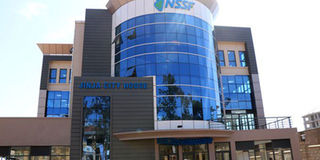Uganda shouldn't be first country to prematurely pay out NSSF -experts

NSSF complex in Jinja town. FILE PHOTO
What you need to know:
- Ms Grace Mukwaya Lule, the executive director, Platform for Labour Action, said the NSSF Act should be amended to also cater for expectant mothers who should be allowed to access their funds once they give birth.
Financial experts have warned those pushing for a 20 percent pay out of the National Social Security Fund (NSSF) savings to its members to cushion them against the Covid-19 economic shocks.
Mr Martin Nsubuga, the chief executive officer, Uganda Retirements Benefits Regulatory Authority warned that globally, it's only Austria that has temporary lent out its equivalent of NSSF savings to its members in the Covid-19 lockdown with expectations paying back.
"No country in the world has paid out its NSSF savings to its members to rescue them in this Covid-19 pandemic lockdown because it’s unrealistic. It's only Austria that lent out to its members but they will pay back," Mr Nsubuga said on Monday evening during an online discussion moderated by Counsel Bernard Oundo and Ms Christine Birabwa Nsubuga.
He said Uganda should not be the first country in the world to pay out 20 percent of the social security savings as this would set bad precedent.
However, he proposed for the creation of a Covid-19 fund to cushion those feeling the pinch in the ongoing lockdown.
The warning by Mr Nsubuga was echoed by the NSSF managing director, Mr Richard Byarugaba who insisted that it's a bad idea to respond to the chorus calls by the public and politicians by paying out the 20 percent as this would cause inflation.
He also rubbished claims by a former finance minister, whom he didn't name and others that NSSF had no capacity to pay out the said money.
"There is no doubt, this money can be found and paid out. The reactions by some people including one of the former ministers whose actions even made President Museveni to transfer the Fund from the gender ministry to Finance, were unfounded," Mr Byarugaba said.
According to him, about 70 percent of the social security contributors are below the age of 30.
“Meaning their savings are still low and if there is an enabling law for us to pay them, on average, they’ll be getting between Shs1m to Shs2m," he added.
According to him, about 80 percent of Ugandans don’t have alternative source of income to turn to when they retire apart from their NSSF savings, a move he said would be unwise to start spending it now.
Kampala Central MP, Mr Muhammad Nsereko who was among the panelists asked Mr Byarugaba to pay to those members who are in need and not to all.
"We are simply saying, members can only access their 20 percent or even less of their savings if they need it especially those who have lost their jobs as a result of Covid-19 disruptions. It's not going to be mandatory," MP Nsereko submitted.
"The other worry of causing inflation can be mitigated by staggering the payment schedule for a period of time like six months and not a lump sum payment. You don't know how a member will use Shs2m; they might multiply it and turn around businesses that would be employing other people tomorrow," he added.
Another panelist, Dr Phiona Muhwezi Mpanga, a lecturer at School of Law, Makerere University said: "The 20 percent we are focusing on is wrong. We should aim at increasing coverage and benefits. Gone are the days when our parents had stable jobs and they could be looking towards retirement and get their package, now days, our people frequently change jobs and this has left some jobless. We should amend the NSSF Act to cater for those who are rendered unemployed," said.
Likewise, Ms Grace Mukwaya Lule, the executive director, Platform for Labour Action, said the NSSF Act should be amended to also cater for expectant mothers who should be allowed to access their funds once they give birth.
"The amendment should be effected to include payment to nursing mothers since some of them have been laid off because of their situation," Ms Mukwaya said.
The meeting came just hours after a concerned citizen, Mr Morrison Rwakakamba, dragged the NSSF and the Attorney General to the Constitutional Court.
Mr Rwakakamba is, among other orders, seeking court to compel the Fund to pay its members at least 20 percent of their savings to cushion them from the economic shocks caused by Covid-19 pandemic and lockdown.




